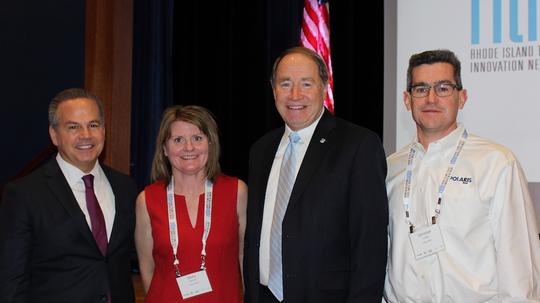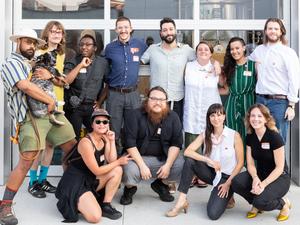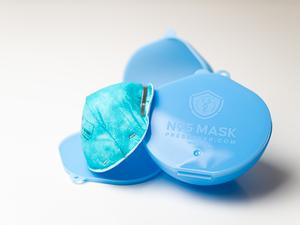
Although there has been a lot of decline over the last 30 years, Rhode Island’s textile industry is still going strong, supporting thousands of jobs and significantly contributing to state’s overall economy.
However, very few people in the general public — and even some in the industry — are aware of this.
Now, a new group called the Rhode Island Textile Innovation Network is hoping to change the perception of the textile industry in a big way.
The organization is an affiliate of textile manufacturers that seeks to bring the industry together to streamline resources and hiring practices, identify more people to work in the industry and show that it has come a long way in recent years.
“One of the things we want to do is bring all the textile companies that are here together, because one of the things we have heard a lot of is that companies would go to trade shows and run into somebody that they didn't know existed who was from Rhode Island,” said Mary Johnson, program manager of RITIN. “All the companies here have gotten so focused on just staying alive and adapting to the realities and finding new markets in which to compete in, they didn't have a lot of time for networking and for making connections or learning who was here in the local supply chain.”
Started by U.S. Sen. Sheldon Whitehouse, D-R.I., the organization has been in the formation stage for six or seven years now. Every time a group of textile executives met to discuss the initiative, it would eventually fall to the wayside because everyone was so busy running their companies, according to Johnson.
But a few years ago, the University of Rhode Island Business Engagement Center started to get interested and became a co-founder of the initiative.
They got Polaris MEP, a statewide nonprofit working to assist and grow Rhode Island's manufacturing industry, to run the project. Then RITIN also partnered with and got support from the Rhode Island Department of Labor and Training’s Real Jobs RI program, the Rhode Island Manufacturers Association and the Rhode Island Commerce Corporation.
The program now has some funding and dedicated staff, which consists of Johnson, who also works at Polaris MEP, an intern named Samantha Myette, who is a student at URI’s College of Business, and a steering committee.
Johnson and staff have spent the last 1.5 years identifying what remains of textile manufacturers in Rhode Island.
They found that there are still more than 70 textile companies in the Ocean State. These entities are supplying 2,500 jobs, from entry level to high-skilled design and chemical engineering roles.
That puts the industry at about half of what it was in its heyday, according to Johnson, who added that the it has been stable for the last 10 to 12 years.
Moving forward, Johnson said in addition to bringing people together, RITIN’s goal is to combat the big drop in employment that occurred between the 1980s and the early 2000s.
“If you needed to hire somebody in the past, chances are there was somebody who had been laid off who you could hire who was already fairly skilled, and so there was a drift in terms of recruiting new young people and training into the industry,” she said. “So, we have an enormous number of tax employees who are headed into retirement in the next five to 10 years. And then there are some very young people who are in, and there's a big gap in the middle.”
The industry will not only need to identify new employees, but also supply training for both these recent entrants and existing workers in the industry. Education is especially important for the industry's newcomers, allowing them to eventually scale up and take over some of the higher-skilled jobs of those retiring.
The other big goal RITIN wants to accomplish is to show the general public what the textile industry really looks like, as it feels most people have a very antiquated picture of manufacturing.
For instance, did you know the Pawtucket-based Cooley Group was responsible for making the advanced roofing membrane that covers the new U.S. Bank Stadium, home of the Minnesota Vikings?
Or that another Pawtucket manufacturer, Propel LLC, makes advanced hook-and-loop fastener for the U.S. special operations forces? It's a tool that helps soldiers remain undetected in harsh and dangerous conditions.
To get factoids out like this to the public, Myette’s assignment for the immediate future will be to start to develop outreach programs or other activities that RITIN can use to educate people about the industry, and train people and groups of students interested in getting involved.
Additionally, RITIN plans to host a series of networking events this summer.








